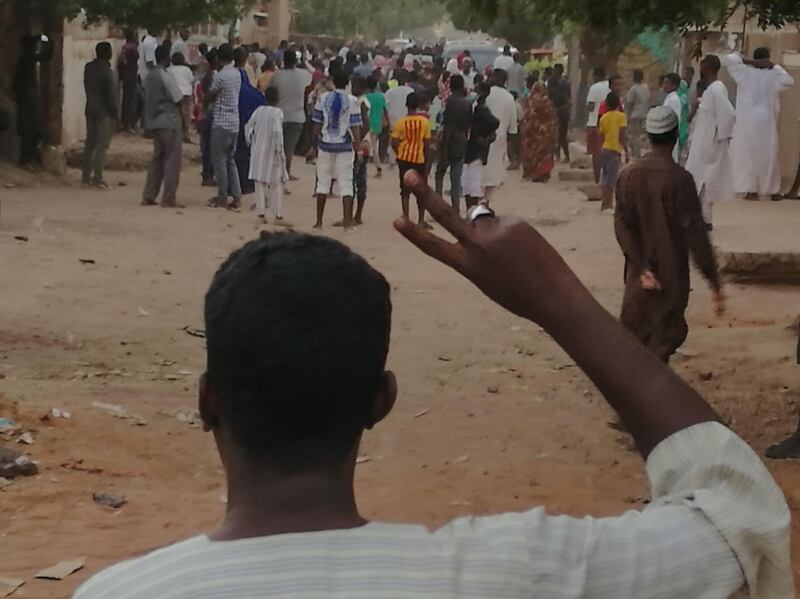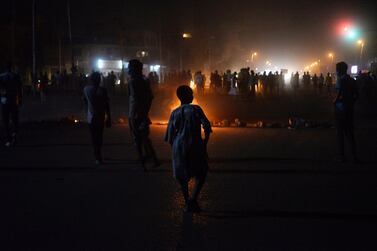Sudan’s longtime ruler Omar Al Bashir has held on to power in the face of two months of deadly street protests calling for him to step down, a stalemate that testifies to the tenacity of both the 74-year-old Islamist leader and the resilience of his detractors.
An Afro-Arab nation that has for decades alternated between looking ready to come unglued and determinedly tearing itself apart, Sudan’s current standoff has plunged it into a political limbo, with Mr Al Bashir’s grip on power slowly weakening while protesters are unable to land a knockout punch.
Mr Al Bashir has ruled Sudan since leading a 1989 military coup that toppled a freely elected but dysfunctional government. Under his watch, Sudan survived one crisis after another, with him unable to bring peace or economic stability to the ethnically and racially diverse nation.
He earned an indictment by the International Criminal Court in 2010 for genocide in Darfur, a western region where forces loyal to him crushed an uprising by ethnic Africans seeking equality with the mostly Muslim and Arabised north. A year later, the animist and Christian south of Sudan seceded under a peace agreement that ended more than two decades of civil war, taking with it most of the country’s oil wealth and sending the country’s economy into a downward spiral.
Already one of the longest serving rulers in the region, Mr Al Bashir has consistently argued that political change in Sudan can only come through the ballot box. He has repeatedly blamed the unrest on foreign plots designed to undermine what he calls Sudan’s “Islamic experiment.”
Activists involved in the protest movement say time is on their side and that the Sudanese leader will eventually be pushed out of office, an assertion that is questioned by analysts who argue that the protests have mostly attracted young people, while failing to attract other segments of society.
However, one prominent analyst, Sudanese Othman Mirghani, believes the ongoing protests have been the source of such serious alarm to authorities that the government has continued to shut down universities and social media sites like Facebook and WhatsApp since the unrest started.
“The protest movement is somewhat slow, but it will at the end deliver political change,” Mr Mirghani predicted by telephone from Khartoum, the Sudanese capital. He also cited what he described as the elaborate security precautions in Khartoum on the days of protests as evidence of a government that sees the demonstrations as a serious threat.
“The protests have deprived the regime of its political legitimacy,” said Hany Raslan, an Egyptian expert on Sudan at Cairo’s Al Ahram Centre for Political and Strategic Studies. “They have caused alarm inside the regime and eroded some of its internal infrastructure,” he added, but warned that the protesters have so far failed to mobilise in sufficient numbers in the streets to push Mr Al Bashir out.
He said one reason why Mr Al Bashir has survived until now is that he has for years worked on gathering the country’s “political strings” in his hands. “He is in control of the political balances inside the regime,” Mr Raslan said, citing the Sudanese leader’s track record of playing allies and close aides off against each other and banishing to the sidelines political figures strong enough to challenge him. Since 2000, Mr Al Bashir has sidelined Hassan Al Turabi, spiritual father of the Islamist movement in Sudan and the sponsor of the 1989 coup, vice president and one-time heir apparent Ali Othman Taha, and ruling party heavyweight Nafiaa Ali Nafiaa.
Asil Abdou, a 25-year-old activist from Khartoum, shares the analysts’ cautious optimism on the prospect of political change in Sudan.
“The movement is growing, but we don’t want people to exhaust themselves. We want them to pace themselves. We want them to protest one day and go to work the next day. We are mostly poor in Sudan, so we want them to continue to earn a wage and put food on the table,” she said by telephone.
“We have no problem staying on the streets for another five months. Every march is attracting more people than the previous one. We are conserving our energy for ‘zero hour’ when all the doors are open and everyone is out on the streets,” she said.
Ms Abdou and other activists acknowledge that the frequency and size of demonstrations outside Khartoum have waned in recent weeks, something they attribute to the use of excessive force there by police. “But the epicentre of uprisings has always been in Khartoum,” Ms Abdou said.
Since independence in 1956, Sudan has seen two popular uprisings against military rule, in 1964 and 1985. In both cases, democratically elected governments followed, but they failed to improve the economy or end long-running civil wars with the south. They were eventually toppled by the military in 1969 and 1989 respectively.
Activists behind the ongoing protests say they want Mr Al Bashir’s Islamist government to be replaced with an interim administration of technocrats who would announce dates for elections. But Mr Raslan, the Egyptian analyst, believes chaos would prevail during the transitional period and the Islamists would likely reinvent themselves to bounce back to power.
Of all of Sudan’s neighbours, Egypt is believed to be the most worried about Muslim Brotherhood Islamists seizing power across its southern border. With zero tolerance for any form of political Islam at home, Egypt has reservedly offered Mr Al Bashir support despite his hallmark unpredictability.
In the last few years, Mr Al Bashir caused alarm in Egypt by courting Cairo rivals Qatar and Turkey and siding with Ethiopia in its dispute with Egypt over the impact on Cairo’s share of the Nile waters of a giant, under-construction dam Addis Ababa is building. He also has stoked a long-running but lately dormant border dispute with Egypt.
“Egypt realises that Al Bashir has been burnt, but it would rather see him stay in office than see hardline Muslim Brotherhood leaders succeed him,” said one Egyptian government insider who monitors Sudan closely but who spoke on condition of anonymity because of the sensitivity of the subject.







